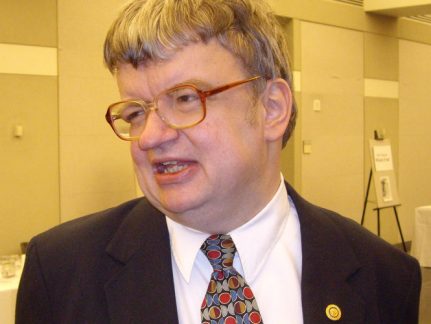Savant syndrome – unusual abilities due to disability?


Last modified: 03-05-2020
The twins John and Michael were able to say what happened and what was the weather every day of their lives, since they were four years old. They were able to repeat even a 300-digit number and specify what was or will be the day of the week on any day of the 40 000 years ago or 40 000 years into the future. They loved to “talk” to each other by mentioning few-digits prime numbers.
Neurologist Oliver Sacks joined their once with previously prepared a set of prime numbers – up to 10-digit. In response to the 6-digit number given by one of the twins, Sacks gave 8-digit. After a long moment of astonishment that someone joined their “conversation” and after a few minutes of thought, John gave a 9-digit prime number. A moment later, his brother said another. Sacks mentioned in response a 10-digit prime number, and after a few minutes was out of play, when John spoke 12-digit number. After an hour twins exchanged a 20-digit numbers. Probably also primes, but then, in 1966 Sacks was not able to check it out.
Oliver Sacks also tells in his book a story when from a table has fallen a box of matches. The twins immediately unanimously shouted: “111”, and a moment later three times declared “37”. As it turned out that was just the number of matches: 3 times 37, or 111. Interestingly, John and Michael did not know how to multiply, divide, add, or subtract. When asked how they so quickly calculated the amount of matches, or how they calculate what will be the day of the week a certain date, they replied that they just “see” the answer. Their IQ was only 60 – at the level of mental retardation. Both of them were also people with autism – a disorder characterized by difficulties in social interaction and communication, and behavioral problems, such as limited interests, sensitivity to certain stimuli, repetitive behavior.
Kim Peek – often called a walking encyclopedia had memorized thousands of books, the highways numbers in any American city, town and district, assigned to each region codes and postal codes and the names of serving them television stations and telephone networks. He also had extraordinary knowledge of classical music – was able to recognize most of the songs, indicate the date of their publication or first performance, as well as the place and date of birth and the death of the composer. Like the twins, he also had an incredible calendrical skills. Additionally he suffered from developmental disorders and in many basic living situations he needed his father’s help.

In turn, Stephen Wiltshire, an autistic artist with extraordinary photographic memory, can draw from memory the entire city, including details such as the number of windows in the buildings after just one helicopter flight over the city.
They all have savant syndrome, a disorder characterized by above-average abilities while mentally retarded. Savants average IQ is from 40 to 70; most of them are men. More than half of savants are autistic people and the disorder occurs in approx. 10% of patients with autism.
How “calendrical” savants know what was the day of the week July 15, 1728., or what will be February 2, 2500?
The speed of response and the fact that they often do not know how to do simple addition and subtraction, or explain its method of calculation indicates that they remember the answer. Many of them are autistic people, often staying alone. Maybe spend a lot of time browsing calendars, which combined with their superior ability to remember, gives just such results. On the other hand, research shows that the farther the date, the longer time to think they need. Some savants are also able to specify the day of the week between the years so far, that it is impossible that they had the opportunity to see such calendar. So perhaps it’s not a matter of memory, but calculations? It is indicated by making of systematic errors arising from ignorance of certain rules of the calendar. It is also possible that they remember certain calendar rules, and on this basis they calculate the day of the week.
The London psychologists in the late 90s examined the 10 calendrical savants, to find out how they respond. 8 of them were autistic people, the other 2 had only non-specific learning problems. They were asked questions like: “What day of the week was the July 10, 1968,” or “what day will be September 8, 2024”. The study consisted of six sessions, each containing a question of another range of years:
- – dates from 20th century
- – 19th century and first part of 21th century,
- – 18th, 22th and later dates of 21th century,
- – years 2363 – 2367, 2791 – 2795, 3574 – 3578, 5191 – 5195, 8374 – 8378,
- – years 12 819 – 12 823, 51 275 – 51 279, 204 830 – 204 833, 819 202 – 819 206,
- – years 912 819 – 912 823, 1 204 830 – 1 204 834, 1 819 202 – 1 819 206, 2 051 275 – 2 051 279
They were asked also the question in the years 1280 – 1752, to see if they know about the changes that caused the transition from the Julian calendar to the Gregorian (before the introduction of the Gregorian leap years were calculated different way and the change of calendar removed days from 5 to 14 October 1582 r.).
It turned out that only one person knew about the changes resulting from the transition of one calendar to another. In the third session, 5 people had results above the probability of guessing at all periods, and 2 people responded as if all years were leap years. Except for one person, everyone needed more time to consider the questions relating to further periods. The fastest period for all subjects were years 1968-1976, which were the closest to years, when their abilities developed. One of the subjects responded correctly more often than would result from the case to the remotest years at fourth session, and only one dealt with the farthest period – dates from the years more than 2 million.
A total of 4 people exceeded the year 2300, that is, they answered correctly on questions about the dates so far, that it is unlikely they have the opportunity to remember the answer when viewing calendars. The same 4 people and one more were making systematic errors arising from ignorance of the rules. Two of these people were writing on paper intermediate steps before they answered the question. We can conclude that these 5 people based answers on calculations.
The researchers also tested the same savants for the ability to calculate and found that 6 of them have sufficient capacity of counting in mind, to be able to calculate the days of the week. Only one person could not add or subtract, mentally or on paper, two-digit numbers. One person with very little skill of counting probably based answers on memory and his ability were unusual even for a savant. He had an incredible memory for birthdays of family and friends – for almost every day he could tell who just has a birthday.
It turns out that some calendrical savants use calculations, and others rely on memory. The abilities of twins who did not have sufficient arithmetic capacity to calculate the days of the week, and at the same time were able to answer questions in the field of years much further than the calendars available to them, are however still incomprehensible to me.
Interesting results gave the study by another team of psychologists from the same institute in London. The researchers wanted to follow the development of calendrical skills. They came out with the assumption that if savants develop their skills by discovering the rules of the calendar, their ability should increase with age.
They found the two boys – described as JF and CF – and examined their calendrical skills in the space of two years. JF during the first examination was 5 years and 7 months old. He did well in school and liked to play with his peers. He learned to read at the age of four years and had a very good memory for all the numbers, for example registration numbers, dates of birth, addresses. CF was 6 years and 7 months old, he liked to play with friends, but also to spend time alone. He had a good ability to concentrate and specific interest in the dates, and not the overall numbers. He learned to read only at school. Both boys had lower scores than adults savants, but significantly higher than the result from the probability of guessing.
2 years later, contrary to the predictions of scientists, their abilities did not improve. CF was even slower and less accurate than during the first test. Both were less willing to answer. Why these results? Perhaps savant abilities can not develop in normal, healthy people – they are something “instead of”. When some normal functions of brain are for some reason not in use, only in such persons may develop savant abilities. The conclusion can be drawn from the fact that both boys were for a time cut off from the others. JF to age of 3 did not hear, and CF had vision problems. Later, however, during a two-year brake, they developed other common interests such that they share with their peers, eg. football, cars. CF admitted that he felt that his ability is unusual and did not want the kids at school all the time asking him about dates. Also, the second boy said that he had lost interest in dates.

The theory that savant skills are something that can develop only when other typical abilities are not developed confirmes also a case of autistic Nadia. At the age of 3 years revealed in her amazing ability to draw, rare even in adults (figure on the right she made at approx. 3.5 years). ;At the same time, during the first few years of life, she was speaking only single words. After learning at school between 7 and 9 years of age, she improved her communication skills, but have worsened the ability to draw.
What is the cause of savant syndrome?
Many data indicate that the cause of savant syndrome is impaired function of the left hemisphere of the brain, which causes a compensatory increase in the activity of the right hemisphere. Bernard Rimland of the Autism Research Institute, searching the database of more than 34 000 people with autism noted that the extraordinary abilities of people with autism are usually related to the functions of the right hemisphere, and the most disadvantaged – with the functions of the left. It is the right hemisphere which is responsible for musical ability, artistic, mathematical and related to spatial orientation, and manual dexterity. The SPECT test (single photon emission computed tomography) showed in one savant-artist increased blood flow in the anterior cortex, and reduced in the left temporal lobe.
There are also known cases of creation of savant skills over a lifetime, resulting in damage of the left hemisphere. T. L. Brink described a healthy nine-year, which as a result of damage of left hemisphere caused by the bullet, lost his hearing and speech, and suffered a right-hand paralysis of the body. At the same time he developed extraordinary mechanical ability, characteristic of people with savant syndrome. Well-known are also several cases of outstanding creation of artistic ability in elderly patients with symptoms of frontotemporal dementia (FTD), who had the damage in the left hemisphere.
References
- Website with pictures of Stephen Wiltshire
- Darold A. Treffert, Gregory L. Wallace “Wyspy geniuszu”, Świat Nauki, 8/2002
- Oliver Sacks “Man who mistook his wife for a hut“
- Cowan R., Stainthorp R., Kapnogianni S., Anastasiou M. (2004). The development of calendrical skills. Cognitive Development, 19(2), 169-178.
- Cowan R., O’Connor N., Samella K. (2003). The skills and methods of calendrical savants, Intelligence, 31(1), 51-65.
Author: Maja Kochanowska






Add comment